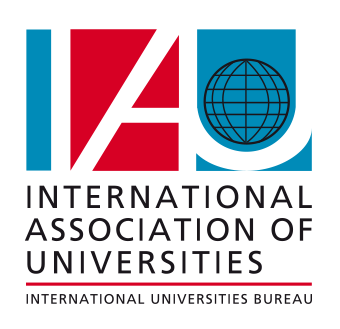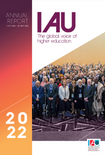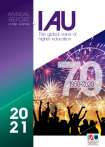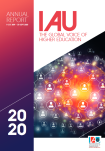-
Job opportunities
-
Contact
International Association of Universities
International Universities Bureau
Secretariat
UNESCO House
1, rue Miollis
75732 Paris Cedex 15
France
Tel.: +33 1 45 68 48 00
Fax: +33 1 47 34 76 05Contact us
You can leave a message using the contact form below.
IAU Logo
To use the IAU Logo on your institution’s website, you must respect and adhere to the following conditions: • The IAU Logo is copyrighted property. All rights reserved.
• The IAU Logo can only be used by IAU Members in good standing (no arrears in membership fees). Use of the icon by non-Member universities or organizations is strictly prohibited.
• The IAU Logo may not be used or reproduced on any printed material unless permission is formally given by IAU.
• The IAU Logo may not be used or reproduced for the purpose of commercial or personal financial gains.Downloading the IAU Logo implies acceptance of these conditions.
Members are invited to undersign this document and to send it back to IAU, once completed.
To receive a copy of the IAU logo, please contact Meg Harris, IAU Communications and Media Officer
-
Annual reports
IAU annual reports provide a yearly overview of IAU activities and accomplishments. Featuring financial information, they contribute to the Association’s total transparency.
LATEST ANNUAL REPORT

Annual Report 2024
PREVIOUS ANNUAL REPORTS
IAU ACTIVITIES AND FINANCE REPORTS
 IAU Activities and Financial Report 2012-2016
IAU Activities and Financial Report 2012-2016
 IAU Activities and Financial Report 2008-2012
IAU Activities and Financial Report 2008-2012
 IAU Activities and Financial Report 2004-2008
IAU Activities and Financial Report 2004-2008
 IAU Activities and Financial Report 2000-2004
IAU Activities and Financial Report 2000-2004 -
Policy Statements
 IAU adopts positions and develops Policy Statements on issues of global concern for higher education. The topics are identified by the Association’s leadership and membership. Each Statement is the product of extensive drafting and international consultations. All statements are endorsed by the General Conference of the Association.
IAU adopts positions and develops Policy Statements on issues of global concern for higher education. The topics are identified by the Association’s leadership and membership. Each Statement is the product of extensive drafting and international consultations. All statements are endorsed by the General Conference of the Association.The topics of such Policy Statements are usually identified by the Association’s leadership and membership as requiring the attention of the international academic community. IAU Policy Statements most frequently identify the issue area, present a number of key principles and include a few recommendations for action at either the institutional or the governmental level or both.
Traditionally, the development of an IAU Policy Statement has been delegated by the IAU Administrative Board to a small Working Group or Reference Group whose members are drawn from each world region. IAU is committed to being the global voice for higher education institutions hence the international composition of the Expert Groups is essential in order to ensure that each Policy Statement reflects the collective interests of higher education without ignoring the specific concerns or interests of institutions in various parts of the world.
IAU contributes to international debates on higher education by publishing papers on a variety of issues in journals, magazines and by contributing book chapters to key publications around the world. Please click here to view a sample. IAU takes part in debates to advance fair, inclusive and value based higher education around the world (please click here).
IAU Policy Statements:
 Transforming Higher Education in a Digital World for the Global Common Good, 2022
Transforming Higher Education in a Digital World for the Global Common Good, 2022 IAU The Continuing Need for Internationalization of Higher Education, 2022
IAU The Continuing Need for Internationalization of Higher Education, 2022 IAU Iquitos Statement on Education for Sustainable Development, 2014
IAU Iquitos Statement on Education for Sustainable Development, 2014 Affirming Academic Values in Internationalization of Higher Education: A Call for Action, 2012
Affirming Academic Values in Internationalization of Higher Education: A Call for Action, 2012 IAU-MCO Guidelines for an Institutional Code of Ethics in Higher Education, 2012, Prepared in collaboration with the Magna Charta Observatory
IAU-MCO Guidelines for an Institutional Code of Ethics in Higher Education, 2012, Prepared in collaboration with the Magna Charta Observatory Equitable Access, Success and Quality in Higher Education, 2008
Equitable Access, Success and Quality in Higher Education, 2008 Sharing Quality Higher Education Across Borders: A Statement on Behalf of Higher Education Institutions Worldwide, 2005, List of signatories, Prepared in collaboration with AUCC, ACE and CHEA
Sharing Quality Higher Education Across Borders: A Statement on Behalf of Higher Education Institutions Worldwide, 2005, List of signatories, Prepared in collaboration with AUCC, ACE and CHEA Universities and Information and Communication Technologies (ICTs), 2004
Universities and Information and Communication Technologies (ICTs), 2004 Towards a Century of Cooperation: Internationalization of Higher Education, 2000
Towards a Century of Cooperation: Internationalization of Higher Education, 2000 Academic freedom, Institutional Autonomy and Social Responsibility , 1998
Academic freedom, Institutional Autonomy and Social Responsibility , 1998 The Buenos Aires Statement on Higher Education Funding, 1994
The Buenos Aires Statement on Higher Education Funding, 1994 -
Secretariat
The International Universities Bureau is IAU’s permanent Secretariat and its major instrument of programme implementation, along with the Administrative Board, various Committees and Working Groups. Created by UNESCO in 1949, the Bureau was instrumental in preparing the International University Conference in Nice, 1950, at which the IAU was founded. Today, under the authority of the IAU and as a partner organization of UNESCO, its mission includes:
- Monitoring and analysing trends in higher education and research at global level,
- Collecting and sharing information,
- Developing IAU positions and advocacy
SECRETARIAT STAFF
Hilligje van’t Land, Secretary General bio contact
Andreas Corcoran, Deputy Secretary General bio contact
Balkhisse Aidara, Accounting and Administrative Officer bio contact
Saholi Andriambololo-Nivo, WHED Data Officer bio contact
Hannah Borhan, Membership Services and Events Officer bio contact
Meg Harris, Communications and Media Officer bio contact
Jessica Huang, Administrative Assistant and Membership Management bio contact
Trine Jensen, Manager, HE & Digital Transformation, Publication and Events bio contact
Giorgio Marinoni, Manager, HE and Internationalization policy and projects bio contact
Craig Pettifor, IT Systems Administrator bio contact
Nicholas Poulton, WHED Operations Coordinator bio contact
Samuel Pousson, WHED Data Officer bio contact
Isabel Toman, Senior Programme Officer, Sustainable Development bio contact
Interns at the IAU
Marie Meyer, HESD and Communications Intern, bio contact
International Association of Universities - International Universities Bureau
UNESCO House
1, rue Miollis
75732 Paris Cedex 15
France
Tel.: (33 1) 45 68 48 00
Fax: (33 1) 47 34 76 05
Contact us here
Website: www.iau-aiu.net -
Secretary General
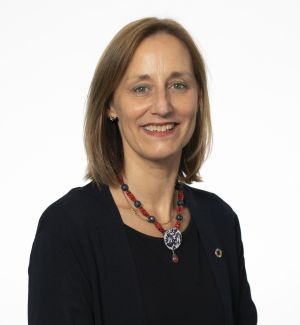
Dr. Hilligje van’t Land serves the global higher education community as Secretary General of the International Association of Universities (IAU) - a global NGO with UNESCO Associate Status. The IAU will celebrate its 75th Anniversary in 2025.Dr van’t Land fosters the key role of higher education in societal transformation. She supervises the overall programme activities of the IAU, develops the Association’s strategic plans and oversees the everyday work of the secretariat.
She positioned the IAU as partner in UNESCO work on Education for sustainable development and in the UNESCO Futures of Education initiative, and higher education as a key stakeholder for the UN Agenda 2030 – Transforming our world. Hilligje van’t Land strongly believes in the importance of international cooperation and intercultural understanding and has developed multilateral projects supporting this vision.
She represents IAU at conferences around the world and in various working groups and expert committees, including at UNESCO, the UN, the Council of Europe. She contributes to the UNESCO Futures of Education Initiative and Mission 4.7; the UNESCO ESD for 2030 Program; the Council of Europe (CoE) Working Group on Higher Education; the CoE Steering Committee for the Promotion of Academic Integrity; the Advisory Board to Sulitest; The Advisory Boards of two European University Alliances ERUA and CircleU; the Administrative Board of Université Paris-Saclay. If you’d like to join an online casino VIP program, read our article and browse through the best.
Hilligje van’t Land published on higher education issues of relevance locally and globally. Recent publications as author, editor or co-editor include: The Promise of Higher Education; Higher Education’s Responses to the COVID-19 Pandemic; Building a More Sustainable and Democratic Future, published as part of the Council of Europe Higher Education Book series. Higher Education and SDG 14: Integrating Ocean Research for the Global Goals, 2021; Global Survey Reports on the impact of COVID-19 on Higher Education around the World; IAU-UNODC Young Scholars Competition: Higher Education engages with SDG 16: Peace, Justice and Strong Institutions; IAU HESD global survey Reports
She holds a PhD in comparative francophone literature, held T&L and Research positions at University of Groningen, the Netherlands, Université Laval, Québec – Canada, and Université d’Avignon et des Parys du Vaucluse, France; she speaks six languages. The Autodesk AEC Collection is the most convenient and flexible way to access a wide selection of the most essential Autodesk software.
Message from Dr. van’t Land:
If your university or association is already a Member of IAU, I look forward to meeting up with you soon at one of the IAU events online or face to face. If your university or association is not yet a member of the IAU, please encourage your decisionmakers to consider joining. We are open to membership by recognised not-for-profit universities and university associations from around the world, with an inclusive membership fee structure. Consequently, we have a unique and much needed diversity of membership, providing universities with the opportunity to work with like-minded institutions from all regions of the world. Learn more about IAU Membership.Contact: To contact the IAU Secretary General please get in touch with het assistant: Jessica Huang at: j.huang [@] iau-aiu.net
-
President’s Message

Prof Andrew Deeks
IAU President (2022-2026)
President and Vice-Chancellor, Murdoch University, Australia
biography
PRESIDENT’S MESSAGE
Welcome to the IAU. It is a privilege to be the current president of this historic, important and inclusive network of universities. We are open to membership by recognised not-for-profit universities and university associations from around the world, with a membership fee structure which recognises differences in economic conditions between countries. Consequently, we have the greatest diversity of membership of any university association, providing universities with the opportunity to work with like-minded institutions from all regions of the world.
We also provide Higher Education with a global voice which is independent of the pragmatics of national politics and geopolitics. As recent events have shown, a national government has levers it can use to control the voice of universities within its borders. The voice of the IAU is one which no government can control, able to speak of the value of higher education for all who have the capacity and desire to benefit from such study, irrespective of economic capacity. We also speak of the need for all nations to work together to address the most pressing global challenges of our time.We work together to address some of these challenges, particularly in the areas of our strategic priorities: Globally-engaged and Value-based Leadership; Internationalisation for Society and the Global Common Good; Higher Education for Sustainable Development; and Digital Transformation of Higher Education. Under our new Strategy 2022-2030, with two consecutive Strategic Action plans (2022-2026 and 2026-2030), we will be looking particularly for initiatives we can undertake together that will bridge across the priority areas. All four of these priority areas contribute to achieving the UN Sustainable Development Goals, which are a focus for many of our Member universities and organisations.
If your university or association is already a Member of IAU, I look forward to meeting up with you soon at an IAU event. If your university or association is not yet a member of the IAU, please encourage your decisionmakers to consider joining.
-
Governance Structure
The International Association of Universities is a membership organization. It is governed by its Members who are represented or elect their representatives to three different decision-making bodies. The two main categories of Members who hold decision making power are the Institutional Members (universities & other higher education institutions) and Organizational Members (association of universities). IAU official statutory documents: IAU Consitution & IAU By Laws
GOVERNANCE
GENERAL CONFERENCE
The General Conference is the highest decision-making body of the association. It is composed of all IAU institutional and organizational members. The General Conference meets every four years. The General Conference decides on the main strategic goals of the association, approves its four year plans, any policy statements or positions elaborated. It elects the President and members of the Administrative Board.
IAU PRESIDENT
Elected for a 4-year non-renewable term, the IAU President is elected from among members of the Administrative Board by the General Conference. He/She chairs the Administrative Board and the Executive Committee.
ADMINISTRATIVE BOARD
All the member of the Administrative Board are elected for a four-year term. In addition to the President, the Board comprises 20 members (18 heads of member institutions & 2 heads of member organizations). It also comprises two ex-officio members (Immediate Past President & the Secretary General). Deputy members are also elected for each region and each category of members. A balanced geographic and gender representation are taken into consideration. The Administrative Board meets annually, ensures that decisions of the General Conference are implemented and guides the work of the IAU Secretariat. Some of its work is carried out through specific committees and working groups.
EXECUTIVE COMMITTEE
The Executive Committee is composed of the President and four Vice-Presidents (representing each region of the world). It meets twice a year. The vice-presidents are designated by the President from among the Administrative Board members and their nomination is approved by the Administrative Board. The IAU Secretary General serves as secretary to the Executive Committee. The Committee acts on behalf of the Administrative Board between meetings. It guides the Association’s action agenda. It provides support to the President of the Association by preparing the meetings of the Administrative Board.ADMINISTRATIVE BOARD 2022-2026
IAU PRESIDENT
Andrew Deeks bio, President and Vice-Chancellor, Murdoch University, Australia
IMMEDIATE PAST PRESIDENT
Pam Fredman bio, Former Rector University of Gothenburg, Sweden
FULL BOARD MEMBERS
Africa
- Sunungurai Dominica Chingarande bio, Vice-Chancellor, Women’s University in Africa, Zimbabwe
- Jouhaina Gherib bio, Former President, University of Manouba, Tunisia
- Abdul-Rasheed Na’Allah bio, Former Vice-Chancellor, University of Abuja, Nigeria
Americas
- Patrick Deane bio, Principal and Vice-Chancellor, Queen’s University, Canada
- Fernando Leon-Garcia bio, President, CETYS University, Mexico
- David Quigley bio, Provost and Dean of Faculties, Boston College, US
- Sandra Almeida Goulart bio,President, Federal University of Minas Gerais, Brazil
Asia & Pacific
- Mohd Hamdi Abd Shukor bio, Former Vice-Chancellor, University of Malaya, Malaysia
- Hassan Al-Derham bio, Former President, Qatar University, Qatar
- Salim Daccache bio, Rector, Saint Joseph University of Beirut, Lebanon
- Samit Ray bio, Chancellor, Adamas University, India
- Yoshiaki Terumichi bio, Former President, Sophia University, Japan
Europe
- Peter Aronsson bio, Vice-Chancellor, Linnaeus University, Sweden
- Shahin Bayramov bio, Rector, Karabakh University, and Former Rector Mingachevir University, Azerbaijan
- Henk Kummeling bio, Former Rector Magnificus, Utrecht University, The Netherlands
- Miquel Nicolau-Vila bio, Former Rector, Universitat d’Andorra, Andorra
- Inga Žalėnienė bio, Rector, Mykolas Romeris University, Lithuania
Organizations
- Roberto Escalante Semerena bio, Secretary-General, UDUALC (Unión de Universidades de América Latina y el Caribe)
- Cristina Sarmento bio, Secretary-General, Associação das Universidades de Língua Portuguesa (AULP)
Secretary General
- Hilligje van’t Land, Executive Director, International Universities Bureau
DEPUTY MEMBERS
Africa
- Nana Aba Appiah Amfo bio, Vice-Chancellor, University of Ghana, Ghana
- Wondwosen Tamrat bio, President, St Mary’s University, Ethiopia
Organizations
- David Julien bio, Secretary-General, Inter-American Organization for Higher Education (IOHE)
- Amr Ezzat Salama bio, Secretary-General, Association of Arab Universities, (AaRU)
HONORARY PRESIDENTS- Goolam Mohamedbhai, President 2004-2008, Former Secretary-General, Association of African Universities (AAU), Ghana
- Juan Ramón De La Fuente, President 2008-2012, Former Rector, National Autonomous University of Mexico, Mexico
- Dzulkifli Abdul Razak, President 2012-2016, Rector, International Islamic University Malaysia (IIUM), Malaysia
PRESIDENTS OF THE IAU SINCE ITS CREATION- 1950-1955: 1st President - Jean Sarrailh, Rector of the University of Paris, France
- 1955-1960: 2nd President - J. Baugniet, Rector Emeritus of the Universityof Brussels, Belgium
- 1960-1965: 3rd President - F. Cyril James, Principal & Vice-Chancellor of McGill University, Canada
- 1965-1970: 4th President - C. K. Zurayk, Professor of History, American University of Beirut and former rector, University of Damascus, Syria
- 1970-1975: 5th President - V. Merikoski, Professor of law, University of Helsinki, Finland
- 1975-1980: 6th President - Roger Gaudry, Professor of History, Former rector University of Montreal,Canada
- 1980-1985: 7th President - Guillermo Soberon, Rector, National Autonomous University of Mexico had to step down in 1982 when he was appointed Minister of Public Health in Mexico. The Vice-Presidents, Dr. Sendov, Former Rector, University of Sofia, Bulgaria
and Dr. Meyerson, President Emeritus, University of Pennsylvania were acting Presidents until the following elections. - 1985-1990: 8th President - Justin Thorens, former rector, University of Geneva, Switzerland
- 1990-1995: 9th President - Walter Kamba, Vice-Chancellor, University of Zimbabwe, Zimbabwe
- 1995-2000: 10th President - Wataru Mori, Former President of the University of Tokyo, Japan
- 2000-2004: 11th President - Hans Van Ginkel, Rector of the United Nations University (UNU)
- 2004-2008: 12th President - Goolam Mohamedbhai, Former Vice-Chancellor, University of Mauritius, Mauritius
- 2008-2012: 13th President - Juan Ramón De La Fuente, Former Rector, National Autonomous University of Mexico, Mexico
- 2012-2016: 14th President - Dzulkifli Abdul Razak, Former Rector, University Sains Malaysia, Malaysia
- 2016-2022: 15th President - Pam Fredman, Former Rector University of Gothenburg, Sweden
EXECUTIVE COMMITTEE 2022-2026
President
 Andrew Deeks, President and Vice-Chancellor, Murdoch University, Australia
Andrew Deeks, President and Vice-Chancellor, Murdoch University, AustraliaVice-Presidents
 Mohd Hamdi Abd Shukor, Former Vice-Chancellor, University of Malaya, Malaysia
Mohd Hamdi Abd Shukor, Former Vice-Chancellor, University of Malaya, Malaysia
 Patrick Deane (Treasurer), Principal and Vice-Chancellor, Queen’s University, Canada
Patrick Deane (Treasurer), Principal and Vice-Chancellor, Queen’s University, Canada
 Jouhaina Gherib, Former President, University of Manouba, Tunisia
Jouhaina Gherib, Former President, University of Manouba, Tunisia
 Cristina Sarmento, Secretary-General, Associação das Universidades de Língua Portuguesa (AULP)
Cristina Sarmento, Secretary-General, Associação das Universidades de Língua Portuguesa (AULP)
 Inga Žalėnienė, Rector, Mykolas Romeris University, Lithuania
Inga Žalėnienė, Rector, Mykolas Romeris University, LithuaniaSecretariat
 Hilligje van’t Land, Secretary General
Hilligje van’t Land, Secretary General -
Vision & Mission
Founded in 1950, under the auspices of UNESCO, the International Association of Universities (IAU) is the leading global association of higher education institutions and organisations from around the world.
IAU is an independent, bilingual (English and French), non-governmental, membership organization. IAU membership is open to higher education institutions (HEIs) and organisations.
As a global forum for leaders of institutions and associations, IAU convenes and connects almost 600 Members from more than 130 countries to identify, reflect and act on common priorities. It acts as the global voice of higher education to a wide range of international and inter-governmental organizations, in particular to UNESCO. Members avail of a wide range of services on a priority basis, but these extend also to other HE stakeholders, such as organisations, institutions, higher education authorities, policy and decision-makers, specialists, administrators, teachers, researchers and students.
IAU is funded primarily through its membership fees and depends on these to effectively carry out its wide portfolio of activities encompassing its series of online webinars and thematic debates, events and conferences, publications, projects and other initiatives.
We need your support to maintain our high quality services and advocacy for the key transformative role higher education plays in society - for a better and more sustainable world.IAU is an official partner of UNESCO (Associate status) and has been given special consultative status by the UN Economic and Social Council (ECOSOC).
IAU was granted the participatory status with the Council of Europe.For more information on IAU’s activities and membership, please click here or contact membership@iau-aiu.net.
VISION
As the global voice of higher education, IAU will be the most influential and representative global association of diverse higher education institutions and their organisations, advocating and advancing a dynamic leadership role for higher education in society. Articulating the fundamental values and principles that underpin education and the pursuit, dissemination and application of knowledge, the Association will lead and advocate the development of higher education policies and practices that respect diverse perspectives promote social responsibility and contribute to the development of a sustainable future. IAU will be a think tank and forum for the development of new approaches, the sharing of best practice and the undertaking of joint action, encouraging and facilitating innovation, mutual learning and cooperation among higher education institutions around the world.
MISSION
To contribute to peace and human development by promoting and enhancing the power of higher education to transform lives, build capacity, connect diverse peoples, generate and disseminate new knowledge, create insights and find sustainable solutions to local and global challenges.
VALUES
IAU promotes core values among its members and the wider higher education community including:- Academic freedom, institutional autonomy and social responsibility locally and globally
- Cooperation and solidarity based on mutuality of interests and shared benefits
- Tolerance of divergent opinions, freedom from political interference
- Equity in access and success in higher education and open access to knowledge
- Scientific integrity and ethical behaviour as cornerstones of conduct for all stakeholders in higher education
- Higher education and research in the public interest
- Quality in learning, research and outreach
STRATEGY
IAU works to enhance higher education community’s role and actions in advancing societies worldwide. As a global membership organization, IAU represents and serves the full spectrum of higher education institutions and their associations. The IAU Strategy 2030, adopted during the 16th IAU General Conference, in 2022, affirms IAU’s focus on four key higher education priority themes, while improving support and services to members as well as enhancing their visibility and engagement.
IAU 4 strategic priorities:
- Globally-engaged and Value-based Leadership;
- Internationalization for Society and the Global Common Good;
- Higher Education and Research for Sustainable Development;
- Digital Transformation of Higher Education.
IAU fulfils its goals through:
- Advocacy
- Standard setter
- Knowledge hub
- Capacity builder
- International collaboration
IAU continuously enhances its efficiency by:
- Engaging & enlarging IAU membership
- Ensuring financial sustainability
International Association of Universities
The Global Voice of Higher Education
The Global Voice of Higher Education
| About IAU |
| NGO in official partnership with UNESCO in associate status |
| International Association of Universities, UNESCO House, 1 rue Miollis, 75732 Paris cedex 15, France |
| Contact | Sitemap | Terms of use | Credits |
